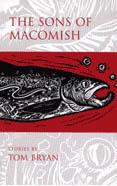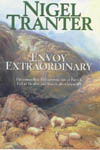Seas, Trees, and so on
With The Sea Road (Canongate, pbk, £9.99) Margaret Elphinstone has come up with a novel of body and substance. It tells the story of Gudrid of Iceland, a Viking hero who travelled from Iceland to Norway and Greenland, to North America and then to Italy. Margaret Elphinstone gives Gudrid a simultaneously contemporary and ancient voice that seems to speak to us down the ages. Gudrid’s voyage works on other levels than the merely geographical and every step of the way Elphinstone asserts her authority over character, period and landscape.
 While Tom Bryan’s short story collection The Sons of Macomish (Two Rivers Press, pbk, £6.99) is eminently of today, he taps the rich lyric mythical tradition of Highland Scotland. These stories, infused with wry darkness, carry strong ecological themes. The collection is attractively produced, with striking black and white illustrations by Peter Hay.
While Tom Bryan’s short story collection The Sons of Macomish (Two Rivers Press, pbk, £6.99) is eminently of today, he taps the rich lyric mythical tradition of Highland Scotland. These stories, infused with wry darkness, carry strong ecological themes. The collection is attractively produced, with striking black and white illustrations by Peter Hay.
Paul Johnston’s latest Quintilian Dalrymple thriller, The Blood Tree (Hodder and Stoughton, pbk, £5.99) has a plot that will keep you reading long after the lights should have gone out. In his now scarily familiar Edinburgh of 2026 where only tourists can enter the city  centre and citizens are confined to the suburbs, a break-in at the archives of the former Scottish Parliament is followed by a succession of increasingly violent murders. As Quintilian Dalrymple starts to investigate the latest string of murders and the mysterious abductions of Edinburgh’s brightest teenagers, a Glasgow connection rapidly becomes apparent. Fittingly while Edinburgh’s dystopic alter ego is the chilling post Enlightenment Edinburgh, Glasgow’s doppelganger is the temptingly hedonistic democratic city-state. Dalrymple’s flit to Glasgow is a clever move, but also one which brings into question how much longer Johnston can sustain his futuristic conceit.
centre and citizens are confined to the suburbs, a break-in at the archives of the former Scottish Parliament is followed by a succession of increasingly violent murders. As Quintilian Dalrymple starts to investigate the latest string of murders and the mysterious abductions of Edinburgh’s brightest teenagers, a Glasgow connection rapidly becomes apparent. Fittingly while Edinburgh’s dystopic alter ego is the chilling post Enlightenment Edinburgh, Glasgow’s doppelganger is the temptingly hedonistic democratic city-state. Dalrymple’s flit to Glasgow is a clever move, but also one which brings into question how much longer Johnston can sustain his futuristic conceit.
The Short Hello (Polygon,pbk, £8.99) is a début collection of short stories by Susie Maguire. Light, frothy and eminently enjoyable, the stories romp through a variety of situations, exploring male and female inner dialogues about desire and fantasy, notions of friendship and the fascination of fame and power. There’s Marina McLaughlin who meets Sean Connery; the Good Housekeeping counsellor, Anne; Anna and Pig spending Christmas in Tangiers; the impossible yellow sofa that puts its own veto on relationships. The situations are ludicrous and the characters on the edge of ridiculous, but the insights echo with a disturbing ring of truth for all that.
The late Nigel Tranter’s fans will no doubt welcome two recently published novels by the popular and prolific author. Aware of his reputation and as a first timer to Tranter, I was prepared to enjoy them. Envoy Extraordinary (Hodder and Stoughton, hbk), is set in thirteenth-century, Scotland, a troubled nation. The heir to the throne, Alexander III, is still a minor and  Scotland is under the rule of a tripartite regency; the country is increasingly under threat from Norsemen and Vikings. Patrick of Dunbar, the quiet and unassuming heir to the famous title of the Cospatrick, is forced into action. Courting Favour (Hodder and Stoughton, hbk, £16.99) INSERT_IMAGE left courting.jpg is set the following century: John Cospatrick, is sent to win over the rebellious Lords of the Isles in the north and then down to London to maintain peace with the English court. By definition, historical novels such as these have their plots set out for them, but this does not prevent the writer from making the connections and embellishments that make a linear narrative into a story worth reading. Nor does it stop the writer from imbuing the life into the characters that allows them to drive that story, nor from using the English language, without recourse to cliché, to breathe new life into the history. To my mind these novels are devoid of these attributes. On the basis of what I realise is no more than a taster of Nigel Tranter’s vast output, I remain bewildered as to his appeal.
Scotland is under the rule of a tripartite regency; the country is increasingly under threat from Norsemen and Vikings. Patrick of Dunbar, the quiet and unassuming heir to the famous title of the Cospatrick, is forced into action. Courting Favour (Hodder and Stoughton, hbk, £16.99) INSERT_IMAGE left courting.jpg is set the following century: John Cospatrick, is sent to win over the rebellious Lords of the Isles in the north and then down to London to maintain peace with the English court. By definition, historical novels such as these have their plots set out for them, but this does not prevent the writer from making the connections and embellishments that make a linear narrative into a story worth reading. Nor does it stop the writer from imbuing the life into the characters that allows them to drive that story, nor from using the English language, without recourse to cliché, to breathe new life into the history. To my mind these novels are devoid of these attributes. On the basis of what I realise is no more than a taster of Nigel Tranter’s vast output, I remain bewildered as to his appeal.
Copyright Clare Simpson 2005.

Comments